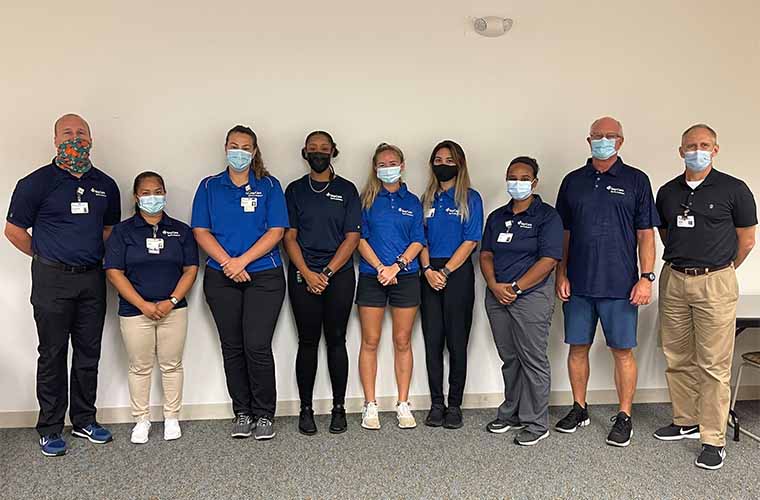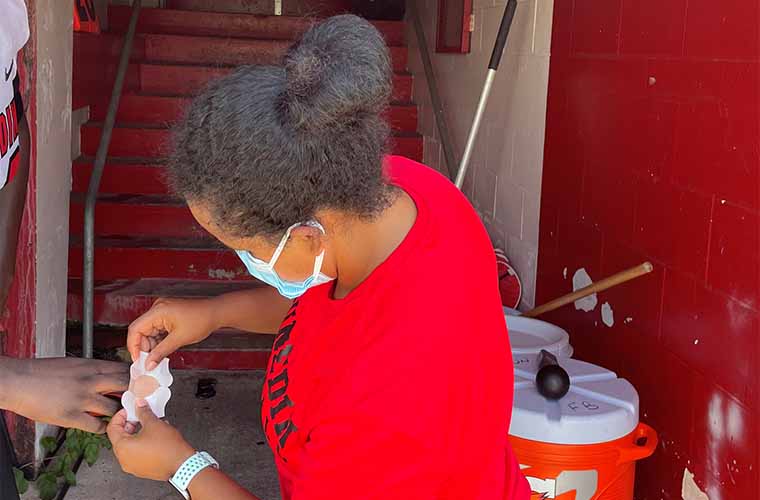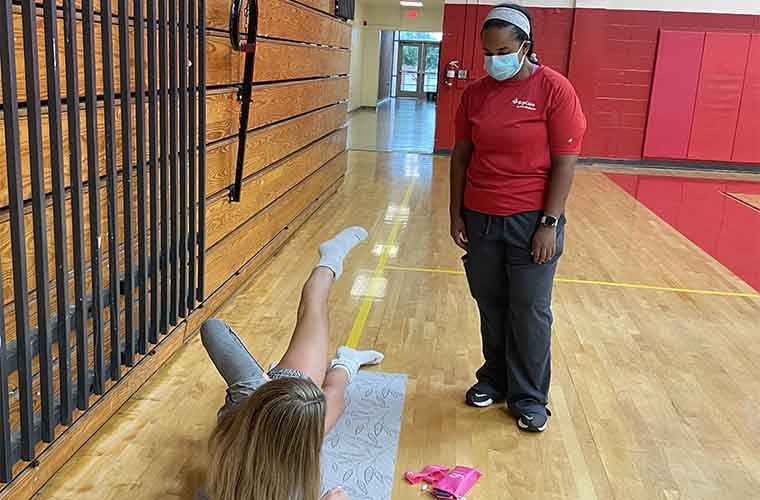BayCare's Certified Athletic Trainers Help Student Athletes Stay Healthy

For more than 20 years, BayCare’s Sports Medicine Outreach Program located on the campus of Morton Plant Hospital has partnered with Pinellas County Schools to provide certified athletic trainers for many of the high schools. For the 2021-22 school year, BayCare’s athletic trainers will be at Boca Ciega, Clearwater, Countryside, Dunedin, East Lake, Gibbs, Lakewood, Largo, Osceola, Palm Harbor, Pinellas Park, and Seminole high schools. The trainers for Boca Ciega, Gibbs and Lakewood high schools are covered athletic trainers from St. Anthony’s Hospital.
The program is best known for helping diagnose and manage concussions using the ImPACT (Immediate Post-Concussion Assessment and Cognitive Testing) program. As valuable as that is, BayCare’s athletic trainers do much more for the students.
“I am an advocate for the student athlete,” said Julie-Ann Burton, a BayCare team member who is the athletic trainer for Dunedin High School.

BayCare’s athletic trainers play a vital role in keeping student athletes safe and healthy during practice and competition. They are experts in their fields possessing at least a bachelor’s degree in a related field and professional certification as an athletic trainer.
Burton is beginning her third year at Dunedin High School. She holds her undergraduate degree in exercise physiology, her master’s degree in athletic training and will soon complete her doctorate.
“My job is to ensure that all my student athletes are playing at 100 percent potential and without risk,” she says.
To do that, she is on campus for practices and home games, as well as football away games. During the school year, she arrives on campus around 12:30 p.m. and leaves after all practices end around 6:30 p.m. unless there is a game. Then, she stays for the game.

At the beginning of the school year, Burton works with football, volleyball and cross- country athletes. One of her primary responsibilities for football practice is monitoring the field temperature and its effect on the players.
The Florida High School Athletic Association, through the Zachary Martin Act signed into law July 1, 2020, requires teams to perform the Wet Bulb Globe Thermometer (WBGT) test, which determines true heat stress temperature by accounting for air currents, relative humidity, and solar load in addition to air temperature and relative humidity. Testing occurs 30 minutes prior to the athletes beginning practice and every hour after that. Depending on the results, athletes may be given more water breaks or practice could be cancelled if weather conditions are deemed unsafe.
At football, Burton watches the players’ posture and body language to see if they might be struggling and talks to them when they come to the sidelines for breaks. If she notices an issue, she speaks with the coach.
While watching athletes for signs of heat illness, Burton also bandages cuts, listens to players explain how they are feeling, reminds them of the need for proper nutrition and hydration, and advises the coach of what is happening physically with the athletes.
“Our Athletic Trainers play a vital role in keeping our student athletes safe during practice and competition,” said Cameron Miller, coordinator, Sports Medicine Outreach. “As licensed healthcare providers, they are responsible for the prevention and recognition of injuries sustained during athletic activities.”
At a recent Dunedin High School volleyball practice, a player hurt her foot and came to Burton to tape it. She told Burton she has pain every volleyball season. As Burton listened to the student explain her injury, she thought it must be more than just the foot. She asked her to run and observed improper running mechanics of the athlete. Upon further evaluation, Burton assessed the student’s glute muscle not activating when she jumped or ran, which caused her to land awkwardly contributing to the foot pain. Burton gave the student home exercises and plans to work with her before practice to strengthen her glute muscle, which should end the foot pain before it leads to more severe injuries.
Attending daily practices allows the athletic trainers to not only treat the medical needs of the athlete related to the sport, but also to better understand the student. “I am not only the student athletes’ health and safety person, but also mental health person,” said Burton. “If I notice something about a particular athlete that may seem a little off, I tell the coach.”
The coaches appreciate the expertise and extra set of eyes as well. “Miss Julie (Burton) is a blessing,” said Dennis Tennell, an assistant football coach at Dunedin High School. “She knows our players and can tell us when they are hurt.”
“It is vital to the health of students athletes to have trained professionals manage their daily medical care” added Miller. “Our athletic trainers work tirelessly to ensure our kids can participate in a safe environment.”
